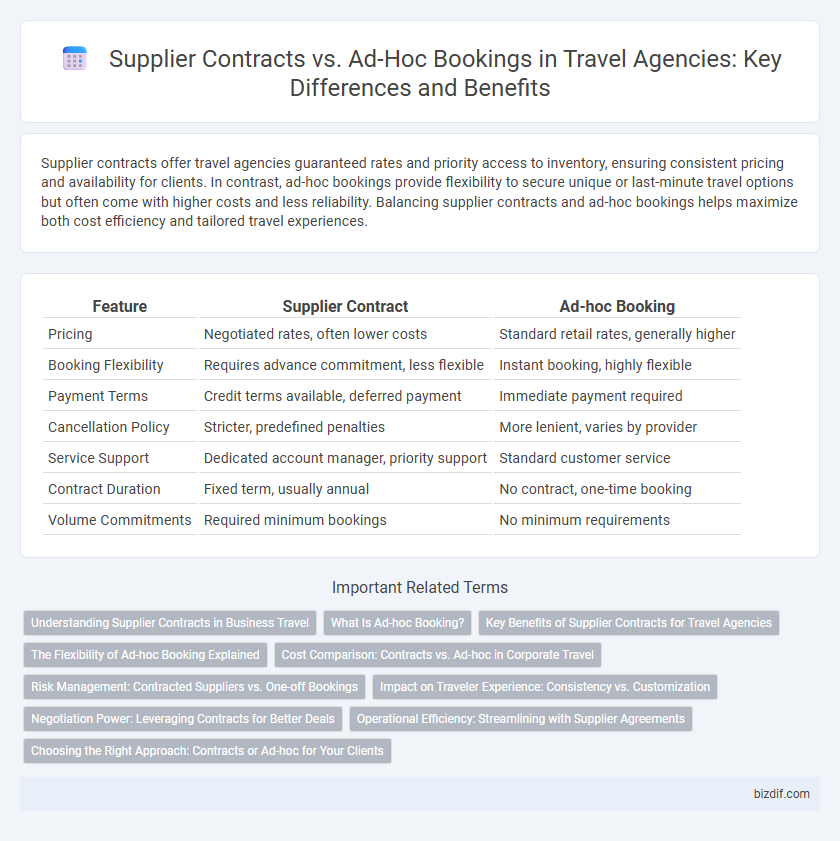Supplier contracts offer travel agencies guaranteed rates and priority access to inventory, ensuring consistent pricing and availability for clients. In contrast, ad-hoc bookings provide flexibility to secure unique or last-minute travel options but often come with higher costs and less reliability. Balancing supplier contracts and ad-hoc bookings helps maximize both cost efficiency and tailored travel experiences.
Table of Comparison
| Feature | Supplier Contract | Ad-hoc Booking |
|---|---|---|
| Pricing | Negotiated rates, often lower costs | Standard retail rates, generally higher |
| Booking Flexibility | Requires advance commitment, less flexible | Instant booking, highly flexible |
| Payment Terms | Credit terms available, deferred payment | Immediate payment required |
| Cancellation Policy | Stricter, predefined penalties | More lenient, varies by provider |
| Service Support | Dedicated account manager, priority support | Standard customer service |
| Contract Duration | Fixed term, usually annual | No contract, one-time booking |
| Volume Commitments | Required minimum bookings | No minimum requirements |
Understanding Supplier Contracts in Business Travel
Supplier contracts in business travel establish negotiated rates, terms, and service-level agreements with hotels, airlines, and car rental companies, ensuring consistent pricing and availability. These agreements enable travel agencies to offer clients reliable options and streamline booking processes compared to ad-hoc bookings, which are arranged spontaneously without prior agreements. Understanding the benefits of supplier contracts allows agencies to optimize costs, improve traveler satisfaction, and maintain better relationships with service providers.
What Is Ad-hoc Booking?
Ad-hoc booking refers to the process of reserving travel services on a case-by-case basis without a long-term agreement or contract with suppliers, offering flexibility for spontaneous or unique travel needs. Unlike supplier contracts, which establish fixed terms, rates, and conditions over a set period, ad-hoc bookings enable travel agencies to access a wide range of options without prior commitment. This approach is ideal for clients requiring last-minute arrangements or customized itineraries that fall outside standard contract provisions.
Key Benefits of Supplier Contracts for Travel Agencies
Supplier contracts offer travel agencies guaranteed room availability and preferential rates, ensuring cost efficiency and consistent inventory access. These agreements facilitate streamlined payment terms and reduce booking errors through established protocols. Long-term contracts strengthen relationships with suppliers, enabling agencies to negotiate better terms and enhance customer satisfaction.
The Flexibility of Ad-hoc Booking Explained
Ad-hoc booking offers superior flexibility compared to supplier contracts by allowing travelers to make reservations without long-term commitments or bulk purchases, adapting easily to sudden changes in plans. Unlike supplier contracts, which often require fixed terms and minimum volumes, ad-hoc bookings provide real-time availability and pricing, maximizing spontaneity and convenience. This flexibility is particularly advantageous for last-minute travel arrangements, dynamic itineraries, and customized travel experiences.
Cost Comparison: Contracts vs. Ad-hoc in Corporate Travel
Supplier contracts in corporate travel typically offer lower negotiated rates and predictable pricing, reducing overall travel expenses compared to ad-hoc bookings, which often incur higher costs due to last-minute availability and premium charges. Contracts also provide volume discounts and fixed service fees, ensuring budget stability and cost savings over time. In contrast, ad-hoc bookings lack these financial benefits, leading to increased expenditure and inconsistent pricing for corporate travel programs.
Risk Management: Contracted Suppliers vs. One-off Bookings
Supplier contracts provide travel agencies with negotiated rates, guaranteed availability, and clearer terms, significantly reducing risks associated with cancellations or price fluctuations. Ad-hoc bookings, while flexible, expose agencies to unpredictable costs, limited supplier commitments, and higher vulnerability to last-minute changes. Prioritizing contracted suppliers enhances risk management by securing stable supply chains and improving customer satisfaction through reliable service delivery.
Impact on Traveler Experience: Consistency vs. Customization
Supplier contracts ensure consistent quality and pricing by establishing predefined terms with service providers, leading to reliable and predictable traveler experiences. Ad-hoc bookings offer greater customization and flexibility, allowing travelers to tailor trips to specific preferences but may result in variability in service quality and pricing. Balancing these approaches affects traveler satisfaction by either prioritizing dependable service or personalized travel options.
Negotiation Power: Leveraging Contracts for Better Deals
Supplier contracts provide travel agencies with stronger negotiation power by securing fixed rates and exclusive deals that ad-hoc bookings cannot guarantee. These contracts enable agencies to leverage volume commitments and establish long-term partnerships, resulting in cost savings and enhanced service quality. Conversely, ad-hoc bookings lack bargaining leverage, often leading to higher prices and limited customization options.
Operational Efficiency: Streamlining with Supplier Agreements
Supplier contracts enhance operational efficiency by providing consistent rates, availability, and terms, reducing the time spent on negotiations and last-minute bookings. Ad-hoc bookings often result in unpredictable costs and require more administrative effort due to frequent individual arrangements. Streamlining travel operations through supplier agreements enables agencies to optimize resource allocation and improve service reliability.
Choosing the Right Approach: Contracts or Ad-hoc for Your Clients
Supplier contracts offer travel agencies guaranteed rates, fixed availability, and streamlined booking processes, optimizing cost-efficiency and client satisfaction for high-volume or repeat bookings. Ad-hoc bookings provide flexibility and customization for unique travel requests or low-frequency itineraries, enabling tailored experiences without long-term commitments. Evaluating client travel patterns and volume ensures the optimal balance between contractual stability and spontaneous booking freedom.
Supplier contract vs Ad-hoc booking Infographic

 bizdif.com
bizdif.com